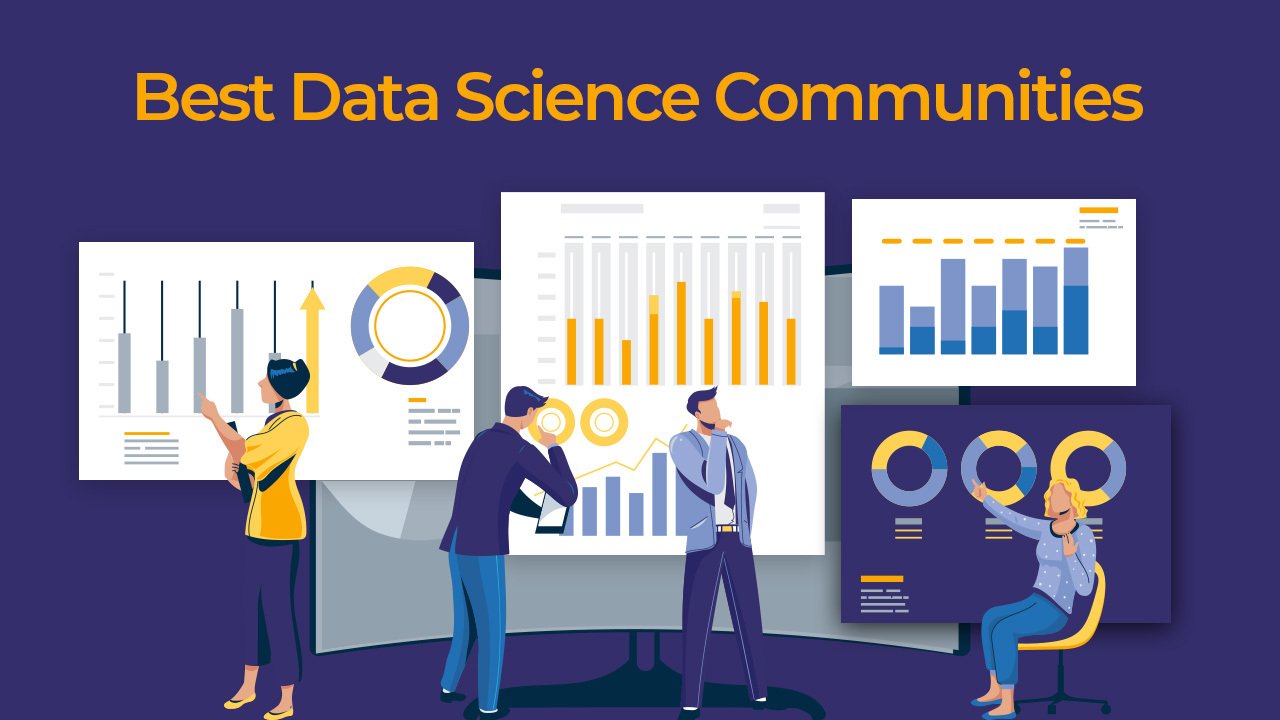In the ever-evolving landscape of data science, the power of collaboration and knowledge-sharing cannot be overstated. As data scientists navigate complex challenges and seek innovative solutions, the importance of connecting with like-minded professionals and accessing a wealth of resources becomes paramount. This is where data science communities come into play. These vibrant hubs of expertise, networking, and learning offer data scientists a platform to exchange insights, discuss cutting-edge trends, and propel their careers forward. In this article, we will delve into a curated list of essential data science communities that every data scientist should be acquainted with. Whether you’re a seasoned practitioner or just embarking on your data science journey, these communities are invaluable repositories of knowledge and camaraderie that can help you thrive in this dynamic field.
Table of Contents
ToggleHere are the top 10 data science communities every data scientist should be familiar with
1. Kaggle Community
Kaggle is a premier data science community and platform that hosts machine learning competitions, datasets, and collaborative projects. It serves as a hub for data scientists, machine learning practitioners, and AI enthusiasts to collaborate, learn, and showcase their skills.
Kaggle offers a range of activities and features, including:
- Competitions: Kaggle hosts data science competitions where participants solve real-world problems using data and machine learning techniques. Competing allows data scientists to learn, apply their skills, and earn recognition.
- Datasets: A vast collection of datasets from various domains is available on Kaggle. Users can explore, analyze, and use these datasets for their own projects.
- Notebooks: Kaggle provides Jupyter Notebook integration, allowing users to create, edit, and share interactive notebooks containing code, visualizations, and explanations.
- Discussion Forums: The Kaggle community includes discussion forums where users can seek advice, share insights, and collaborate on data science challenges.
- Courses and Tutorials: Kaggle offers interactive courses and tutorials covering a range of topics, making it a valuable resource for both beginners and experienced data scientists.
- Kernels: Users can publish and share their analyses, visualizations, and code in kernels, which are like interactive reports.
- Jobs Board: Kaggle also features a job board where data-related job opportunities are posted.
Also Read: How to Delete a Theme in WordPress: A Step-by-Step Guide?
2. DataCamp Community Community
The DataCamp Community is a vibrant online hub for data scientists and analysts to learn, collaborate, and enhance their data science skills. It complements the DataCamp platform by offering a space for learners to connect, share insights, and engage in discussions.
Key features and aspects of the DataCamp Community include:
- Q&A Forum: The community hosts a Q&A forum where learners can ask questions related to data science concepts, programming languages, and specific challenges they are facing. Experts and fellow learners provide answers and solutions.
- Blog Posts: DataCamp Community features a blog section with articles on a wide range of data science topics, from tutorials and how-tos to explorations of the latest trends and technologies.
- Datasets and Projects: Users can access datasets and project ideas to practice their data analysis and visualization skills, and even share their completed projects with the community.
- Discussion Threads: The community provides discussion threads for DataCamp courses, allowing learners to exchange feedback, clarify concepts, and help one another.
- Career Center: DataCamp offers career advice, job opportunities, and tips for advancing in the data science field.
- Meetups and Events: DataCamp sometimes organizes meetups, webinars, and events where learners can connect with instructors, industry professionals, and fellow learners.
- Showcase Your Work: The platform enables learners to showcase their data science projects and skills, gaining recognition within the community.
The DataCamp Community serves as an interactive space for learners to seek help, share their knowledge, and stay updated on the latest advancements in data science. It’s a valuable addition to the DataCamp learning experience, fostering collaboration and engagement among data science enthusiasts.
Also Read: Where Is The DNS Configuration On WordPress?
3. Data Science Central Community
The Data Science Central Community is a comprehensive online platform dedicated to data science professionals, enthusiasts, and practitioners. It serves as a hub for sharing knowledge, insights, and resources related to data science, machine learning, AI, and analytics. If you’re looking to enhance your skills, consider exploring their Data Science Course offerings.
Key features and highlights of the Data Science Central Community include:
- Articles and Blogs: The platform hosts a wide range of articles, blogs, and tutorials written by industry experts and data science practitioners. These cover topics such as data analysis techniques, machine learning algorithms, and best practices.
- Discussions and Forums: Data Science Central provides discussion forums where members can engage in conversations, seek advice, and collaborate on data science challenges.
- Webinars and Events: The community often features webinars, virtual events, and seminars on trending data science topics, allowing members to learn from experts and stay updated on industry developments.
- Job Listings: Data Science Central features a job board with data science-related job listings, making it a valuable resource for career opportunities in the field.
- Resources and Downloads: Members can access a variety of resources, including e-books, whitepapers, and research papers on data science and analytics.
- News and Updates: The community offers curated news and updates related to data science, machine learning, and AI from various sources.
- Network Building: Data Science Central provides opportunities to connect with other professionals in the field, fostering networking and collaboration.
By participating in the Data Science Central Community, data science enthusiasts can benefit from shared knowledge, gain insights from experts, and engage in meaningful discussions that contribute to their professional growth in the dynamic realm of data science.
4. Towards Data Science Community
The Towards Data Science (TDS) community is a widely recognized platform for data science enthusiasts and professionals to share insights, knowledge, and cutting-edge developments in the field. It operates on the Medium blogging platform and covers a wide range of data science topics.
Key aspects and features of the Towards Data Science community include:
- Blogs and Articles: TDS hosts a plethora of blogs and articles contributed by data scientists, researchers, and experts. These articles cover diverse subjects, including machine learning, AI, data analysis, visualization, and more.
- Tutorials and How-Tos: The community is known for providing detailed tutorials and how-to guides on various data science techniques, tools, and frameworks.
- Explorations and Case Studies: Members often share exploratory analyses and real-world case studies that provide insights into practical applications of data science concepts.
- Visualizations and Code Examples: TDS features visually appealing data visualizations along with accompanying code snippets, allowing readers to learn and replicate techniques.
- Community Engagement: Readers can engage with authors through comments and discussions, fostering interaction and learning.
- Latest Trends and Research: The community often covers the latest trends, research papers, and advancements in data science and related fields.
- Diverse Perspectives: TDS encourages contributions from a diverse range of data science practitioners, enabling readers to gain insights from various viewpoints.
The Towards Data Science community provides an accessible and informative space for both beginners and experienced data scientists to learn, share, and stay updated on the latest developments in data science. It’s an excellent resource for those looking to expand their knowledge and skills in this rapidly evolving field.
Also Read: Oxolo Review – Create An Amazing Product AI Video Generator In Minutes
5. Reddit – r/datascience Community
The Reddit community r/datascience is a dynamic and engaging platform for data science enthusiasts, professionals, and learners to connect, share insights, and discuss all things related to data science.
Key features and attributes of the r/datascience community include:
- Discussions and Questions: The community is a space for asking questions, seeking advice, and engaging in discussions about data science concepts, techniques, tools, and challenges.
- Sharing Resources: Members often share links to articles, tutorials, research papers, and online courses related to data science and machine learning.
- Career and Job Advice: The community provides guidance and insights on data science career paths, job opportunities, interview tips, and resume advice.
- AmA (Ask Me Anything) Sessions: Periodically, data science experts, practitioners, and professionals host AmA sessions where community members can ask them questions about their experiences and expertise.
- Data Science News and Updates: The subreddit is a source of news and updates on the latest advancements, trends, and breakthroughs in the data science field.
- Project Showcases: Members can showcase their data science projects, analyses, and visualizations, fostering knowledge sharing and feedback.
- Community Collaboration: The community encourages collaboration, allowing members to connect with others who share similar interests and expertise.
Participating in the r/datascience subreddit can be enriching for data science enthusiasts of all levels. It provides a platform to learn, connect, and engage with a global community that shares a passion for data science and its myriad applications.
Also Read: Understanding Categories vs. Tags: Delving into the Contrast
6. Stack Overflow – Data Science Community
The Stack Overflow – Data Science dedicated to data science is a valuable platform for data scientists, analysts, and enthusiasts to ask questions, share insights, and engage in discussions related to data science concepts, programming, and problem-solving.
Key features and attributes of the Stack Overflow – Data Science community include:
- Questions and Answers: Members can post questions about data science challenges they are facing, and other community members, including experts, provide answers and solutions.
- Programming and Coding: The community is an excellent resource for seeking help with programming languages commonly used in data science, such as Python, R, and SQL.
- Algorithmic and Technical Discussions: Stack Overflow – Data Science is the place to discuss algorithms, methodologies, and technical aspects of data analysis, machine learning, and statistical modeling.
- Code Samples and Debugging: Members can share code snippets, request help with debugging, and receive feedback on their coding practices.
- Best Practices and Insights: The community offers insights into best practices, data science methodologies, and techniques used by professionals in the field.
- Upvoting and Recognition: Users can upvote helpful answers and solutions, providing recognition to contributors who provide valuable insights.
- Community Guidelines: Stack Overflow enforces clear community guidelines that promote respectful and focused interactions, ensuring a productive and positive environment.
Participating in the Stack Overflow – Data Science community allows data science practitioners to tap into a vast pool of expertise and knowledge, getting timely answers to their questions and contributing to the collective learning experience of the community.
Also Read: Understanding Categories vs. Tags: Delving into the Contrast
7. Cross Validated Community
The Cross Validated community is a dedicated platform for statisticians, data analysts, and those interested in statistical analysis and methodology. It serves as a space for asking questions, sharing knowledge, and engaging in discussions related to statistics and data analysis.
Key aspects and features of the Cross Validated community include:
- Statistical Questions and Answers: Members can post questions about statistical concepts, methodologies, and analyses, and other community members provide answers, explanations, and insights.
- Data Analysis and Interpretation: The community is a resource for discussing data analysis techniques, model interpretation, hypothesis testing, and more.
- Machine Learning and AI: Cross-validated covers topics at the intersection of machine learning, AI, and statistics, providing insights into the statistical foundations of these fields.
- R and Statistical Software: Users can seek assistance with using statistical software like R, Python, and other tools commonly used in data analysis.
- Theory and Methodology Discussions: The community delves into theoretical aspects of statistics, probability theory, and advanced statistical methods.
- Collaborative Learning: Users engage in discussions to learn from others, share insights, and collectively improve their understanding of statistical concepts.
- Peer Validation: Community members help validate statistical approaches, ensuring that data analysis is rigorous and accurate.
Participating in the cross-validated community allows statisticians, data analysts, and data science practitioners to access a wealth of statistical knowledge, seek solutions to specific analysis challenges, and contribute to discussions that advance the understanding of statistical concepts across various domains.
Also Read: How to Promote Your Business with Backlinks: Strategies and Tips for Success
8. Data Science Stack Exchange Community
The Data Science Stack Exchange community is a dedicated platform where data scientists, analysts, and enthusiasts can ask questions, share insights, and engage in discussions about various aspects of data science, machine learning, and AI.
Key features and highlights of the Data Science Stack Exchange community include:
- Questions and Answers: Members can ask specific questions related to data science techniques, algorithms, tools, and challenges. Other members provide detailed answers and solutions.
- Machine Learning and AI: The community covers a wide range of topics, including machine learning algorithms, deep learning, natural language processing, and more.
- Code and Programming: Users can seek help with coding issues, code review, and debugging related to data science projects.
- Best Practices and Methodologies: The community offers insights into data science best practices, data preprocessing techniques, feature engineering, and more.
- Model Evaluation and Interpretation: Discussions on model evaluation, performance metrics, and techniques for interpreting machine learning models are common.
- Data Visualization and Analysis: Users can share and seek advice on data visualization techniques, exploratory data analysis, and effective communication of results.
- Community Guidelines: The platform enforces clear guidelines for asking and answering questions, ensuring that discussions are focused and respectful.
Participating in the Data Science Stack Exchange community provides data scientists with an avenue to get expert answers to their questions, share their knowledge, and contribute to a growing repository of data science insights. It’s an essential platform for continuous learning and problem-solving in the field of data science.
Also Read: How to Set Up an FTP Account for WordPress
9. LinkedIn – Data Science Groups Community
LinkedIn – Data Science Groups offers a valuable platform for data science professionals to connect, share insights, and engage in discussions through various data science groups. These groups foster networking, knowledge exchange, and collaboration among individuals in the data science field.
Key aspects and features of LinkedIn Data Science Groups include:
- Networking Opportunities: LinkedIn data science groups provide a platform to connect with fellow data scientists, researchers, professionals, and enthusiasts from around the world.
- Discussion Forums: Group members can engage in discussions about data science trends, methodologies, challenges, and best practices.
- Job Opportunities: Data science groups often share job postings, freelance opportunities, and career-related discussions tailored to professionals in the field.
- Learning Resources: Members may share educational content, articles, research papers, and resources related to data science.
- Industry Insights: Group discussions often highlight insights into the latest industry developments, emerging technologies, and use cases of data science.
- Collaboration Opportunities: LinkedIn groups can be a platform for finding potential collaborators, mentors, and project partners.
When participating in LinkedIn Data Science Groups, professionals can leverage the network’s power to enhance their understanding of the field, build relationships, and stay informed about the latest trends and opportunities in data science.
Also Read: 9 Best AI Avatar Video Generator Tools (Text-To-Video)
10. GitHub – Awesome Data Science Community
The GitHub repository “Awesome Data Science” is a curated collection of resources, tools, libraries, frameworks, and learning materials related to data science. It serves as a comprehensive resource hub for data scientists and enthusiasts seeking high-quality references and tools in the field.
Key highlights and features of the Awesome Data Science repository include:
- Curated Resources: The repository gathers a curated list of resources from various sources, making it a one-stop destination for data science enthusiasts looking for quality references.
- Diverse Topics: The repository covers a wide range of data science topics, including machine learning, data visualization, natural language processing, big data, and more.
- Tools and Libraries: Users can find information about popular data science tools, libraries, and frameworks across different programming languages.
- Learning Materials: The repository includes tutorials, online courses, textbooks, and research papers that can aid in learning various data science concepts.
- Community Contributions: The repository welcomes contributions from the community, ensuring that it remains up-to-date and reflective of the latest trends.
- Open Source: The repository is open source, allowing users to contribute and suggest new resources for inclusion.
Engaging with the Awesome Data Science repository on GitHub provides data science practitioners with a comprehensive directory of resources to aid in their learning journey, skill enhancement, and project development. It’s an invaluable asset for both beginners and experienced professionals in the field.
These communities offer a wealth of resources, discussions, and networking opportunities for data scientists at various stages of their careers. Whether you’re seeking insights, collaboration, or the latest trends in the field, these platforms are essential for your data science journey.
Conclusion
Data science communities play a pivotal role in the dynamic landscape of data science, offering a rich ecosystem for professionals, enthusiasts, and learners alike. These communities provide a space for collaboration, knowledge sharing, and networking, enabling individuals to stay informed about the latest trends, enhance their skills, and find solutions to challenges. Whether through platforms like Kaggle, DataCamp Community, Data Science Central, Towards Data Science, Reddit’s r/datascience, Stack Overflow, Cross Validated, Data Science Stack Exchange, LinkedIn groups, or curated repositories like “Awesome Data Science” on GitHub, these communities foster a culture of continuous learning and innovation. By connecting with like-minded individuals, exchanging insights, and contributing to discussions, participants can thrive in the ever-evolving world of data science, making data-driven discoveries and advancements more accessible to everyone.
Interesting Reads
Best AI Tools For Personal Assistant: Revolutionizing Productivity In Everyday Life
Church Community: What It Is and How to Build It Online
Its High Time To Change Old Powerpoint: Morden Software For Presentation








